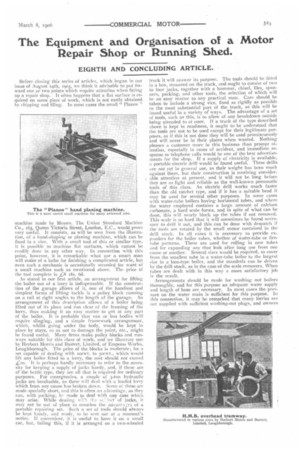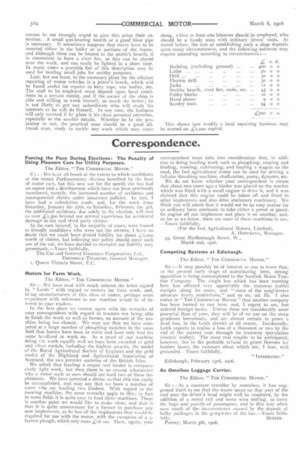The Equipment and Organisation of a Motor Repair Shop or Running Shed.
Page 15

Page 16

If you've noticed an error in this article please click here to report it so we can fix it.
EIGHTH AND CONCLUDING ARTICLE.
Before closing this series of articles, which began in our issue of August 24th, 1925, we think it advisable to put forward one or two points which require attention when fitting up a repair shop. It often happens that a flat surface is required on some piece of work, which is not easily obtained by chipping and filing. In most cases the small" Pianos " machine made by Messrs. The Union Standard Machine Co., 165, Queen Victoria Street, London, E.C., would prove very useful. It consists, as will be seen from the illustration, of a hand-shaping or planing machine, which can be fixed in a vice. With a small tool of this or similar type, it is possible to machine flat surfaces, which cannot be readily done in any other way. In connection with this point, however, it is remarkable what use a smart man will make of a lathe for finishing a complicated article, but even such a mechanic is occasionally stranded for want of a small machine such as mentioned above. The price of the tool complete is .4'8 18s. 6d.
As stated in our first article, an arrangement for lifting the boiler out of a lorry is indispensable. If the construction of the garage allows of it, one of the handiest and simplest forms of lifting tackle is a pulley block running on a rail at right angles to the length of the garage. An arrangement of this description allows of a boiler being lifted out of its place and run clear of the framing of the lorry, thus making it an easy matter to get at any part of the boiler. It is probable that van or bus bodies will require slinging, and a simple framework arrangement, which, whilst going under the body, would be kept in place by stays, so as not to damage the paint, etc., might be found useful. Many firms make pulley blocks and runways suitable for this class of work, and we illustrate one by Herbert Morris and Hastert, Limited, of Empress Works, Loughborough. The price of the blocks is moderate; for a set capable of dealing with 20C411l. to 3ocwe, which would lift any boiler fitted to a lorry, the cost should not exceed Z.to. It is perhaps hardly necessary to refer to the necessity for keeping a supply of jacks handy, and, if these are of the beak type, they are all that is required for ordinary purposes. For emergencies, a couple of 5-ton hydraulic jacks are invaluable, as these will deal with a loaded lorry which from any cause has broken down. Sonic of these are made specially short, and this is often an advantage, as they can, with packing, be made to deal with any case which may arise. While dealing w1:11 .'ect of jacks, it may not be out of place to mention the aciyaral..;es of a portable repairing set. Such a set of tools should always be kept handy, and ready, to be sent. out at a moment's notice. If convenient, it is useful to have it on a small car, but, failing this, if it is arranged on a two-wheeled truck it will answer its purpose. The tools should be fitted in a box, mounted on the truck, and ought to consist of two to four jacks, together with a hammer, chisel, files, spanners, packing, and other tools, the selection of which will be an easy matter to any practical man. Care should, be taken to include a strong vice, fixed as rigidly as possible to the most substantial part of the truck, as this will be found useful in a variety of ways. The advantage of a set of tools, such as this, is to allow of any breakdown outside being attended to at once, if a truck of the type described above is kept in readiness, it ought to be understood that the tools are not to be used except for their legitimate purposes, as if this is not done they will be used promiscuously and will never be in their places when wanted. Nothing pleases a customer more in this business than prompt attention, especially in cases of accident, and immediate response to telephone calls would be one of the best advertisements for the shop. If a supply of electricity is available, a portable electric drill would be found useful. These drills are not yet in general use, as their weight has been much against them, but their construction is receiving consider, able attention at present, and it will not be long before they are as light and reliable as the well-known pneumatic tools of this class. An electric drill works much faster than the old ratchet type, and if it has a suitable head it may be used for several other purposes. In some cases with water-tube boilers having horizontal tubes, and where the water employed contains a large amount of calcium carbonate, a hard scale forms, and in spite of what can be done, this will nearly block up the tubes if not removed. This scale is so hard that it will sometimes be found necessary to drill it out, and this can be done with despatch if the tools are rotated by the small motor contained in the drill stock. In all cases it is necessary to provide expanders for the boiler tubes, whether of water-tube or firetube patterns. These are used for rolling in new tubes and for expanding any that leak after long use from one cause or another. Several sizes would be required, to cover from the smallest tube in a water-tube boiler to the largest size in a loco-type boiler, and the mandrels can be driven by the drill stock, as in the case of the scale removers. When tubes are dealt with in this way a more satisfactory job is the result.
Arrangements should be made for washing out boilers thoroughly, and for this purpose an adequate water supply and length of hose are necessary. In most cases the pressure on the water main is sufficient for this purpose. In this connection, it may be remarked that many lorries are not supplied with sufficient washing-out plugs, and owners cannot be too strongly urged to give this point their attention. A small gas-brazing hearth or a good blow pipe is necessary. It sometimes happens that rivets have to be inserted either in the boiler or in portions of the frame, and although these can be heated in the smith's hearth, it is convenient to have a rivet fire, as this can be placed near the work, and can easily be lighted in a short time. In many cases a portable fire of this description may be used for heating small jobs for smithy purposes. Last, but not least, in the necessary plant for the efficient repairing of motor vehicles is a joiner's bench, which will be found useful for repairs to lorry tops, van bodies, etc. The staff to he employed must depend upon local conditions to a certain extent, and if the owner of the shop is able and willing to work himself, so much the better ; he is not likely to get any subordinate who will study his interests as he will do himself. In any case, the business will only succeed if he gives it his close personal attention, especially to the smaller details. Whether he be the pro`Prietor or not, the practical man should be a good allround man, ready to tackle any work which may come
along, %%Nisi_ at least one labourer should be employed, who should be a handy man with ordinary fitters' tools. As
stated before, the cost of establishing such a shop depends upon many circumstances, and the following estimate may require amending according to circumstances :— s. d.
This shows how readily a local repairing business may be started on ,4-t,000 capital.




















